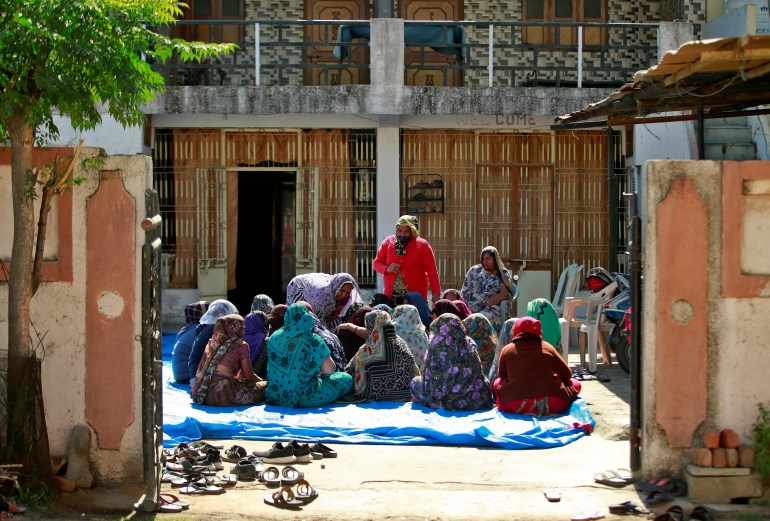India’s High Commission in Ottawa confirms the identities of the four Indians who attempted to cross the border by foot.
Officials in Canada say they have confirmed the identities of four Indian nationals whose frozen bodies were found in Manitoba near the Canada-United States border last week.
The High Commission of India in Ottawa on Thursday released a statement saying the four who died were Jagdish Baldevbhai Patel, a 39-year-old man, Vaishaliben Jagdishkumar Patel, a 37-year-old woman, Vihangi Jagdishkumar Patel, an 11-year-old girl, and Dharmik Jagdishkumar Patel, a three-year-old boy
The family’s immediate relatives have been informed, the High Commission said in its statement, highlighting the need “to ensure that migration and mobility are made safe and legal and that such tragedies do not recur”.
Investigators say the family of four had attempted to cross over the border by foot on January 19 during severe winter weather and died from exposure.
Officials said they got separated from the group of 18 people and were probably caught in a blizzard, resulting in a tragedy Canadian Prime Minister Justin Trudeau described as “mind-blowing”.
The Royal Canadian Mounted Police (RCMP) said they believe the family arrived in Canada on January 12, first reaching Toronto, and then travelled to Emerson, Manitoba, around January 18.
No vehicle was abandoned near the border, suggesting someone dropped them off and left, said Rob Hill, a criminal operations officer.
 Relatives of the Patel family gather to mourn the deaths at Dingucha village in the western Indian state of Gujarat [Amit Dave/Reuters]
Relatives of the Patel family gather to mourn the deaths at Dingucha village in the western Indian state of Gujarat [Amit Dave/Reuters]A special team, led by a senior consular officer from the Consulate General of India, is in Manitoba to help with investigations on the Canadian side and to offer services for the victims.
The RCMP in Manitoba said they found the four bodies near Emerson after the US border patrol agents advised them they had picked up a group of Indian nationals on the US side.
One of the individuals, Steve Shand of Deltona, Florida, was found with a backpack full of items for an infant. He told investigators he was carrying the backpack for a group that got separated from them.
Investigators have said they believe the deaths are linked to a human trafficking scheme.
Shand faces counts of transporting or attempting to “transport illegal aliens”. He was released on conditional bail on Monday.

Meanwhile, six people running a travel and tourism company in the western state of Gujarat have been arrested in connection with the deaths, said police official AK Jhala in the state capital, Gandhinagar.
“We are now trying to nab the human traffickers who managed to send this family and others abroad via illegal channels,” he added.
Ashish Bhatia, director general of police in Gujarat, said investigators are trying to determine whether there was a travel agent in India who helped the group.
“The nexus of human trafficking runs deep, often involving local politicians too,” said police official Jhala, adding that people even sell their land and homes to fund their migration to the US or Canada.
Community shocked
Little else is known about the Indian nationals taken into custody in the U.S. The court document filed last week said they speak limited or no English, but are fluent in Gujarati, a language spoken in western India.
Hemant Shah, a member of the Gujarati community in Winnipeg, said he was shocked to learn the news last week about the four people who died — as were friends and colleagues in both Canada and India.
“My heart is crying. What they may have gone through crossing this border, you know, we can’t visualize. We can’t imagine this,” said Shah, urging anyone who knows anything about the family’s journey to come forward.
“Maybe it will help other people who are coming this way. They may stop this. Because this is not — the loss of four lives, it’s not easy. Especially two kids.”
Shah, who is also the trade director for Overseas Friends of India Canada, said he hopes the tragedy spurs Canadian and Indian governments and organizations to do more outreach and education about the risks of trying to cross the Canada-U.S. border on foot.
The High Commission of India in Ottawa and the country’s consulate in Toronto are working closely with authorities in Canada on the investigation, the High Commission release said.
A special team led by a senior consular officer is in Manitoba to help those investigations and offer consular services for victims.
Canada is a preferred destination for Indian immigrants and students, the news release said, and the two countries work together to ensure the safety and well-being of Indian immigrants in Canada.
“The two countries have a regular consular dialogue which takes up issues related to migration and welfare of citizens in each other’s territories,” the release said.
The death of the family discovered last week has highlighted the need to ensure migration and mobility between countries are made safe and legal to avoid similar tragedies, the release said.
A number of ideas to prevent irregular migration, human smuggling and trafficking are being discussed by the two countries, it said. That includes a comprehensive migration and mobility partnership agreement with Canada, which the release said remains under the consideration of the Canadian government.
Canada is a sought-after destination by Indians facing massive unemployment at home.
However, crossings into the US from Canada are relatively rare: the US Customs and Border Patrol (CBP) apprehensions of migrants trying to cross between ports of entry along the US-Canada border dropped from 6,806 in 2009 to 916 in 2021.
CBP apprehended 339 Indians trying to cross into the US at the northern border in 2019, 129 in 2020 and 41 last year.
By contrast, the RCMP apprehended 16,503 asylum seekers crossing north between border crossings in 2019.
